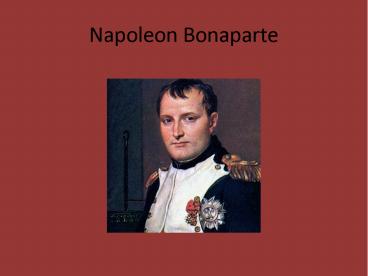Napoleon Bonaparte - PowerPoint PPT Presentation
Title:
Napoleon Bonaparte
Description:
Napoleon Bonaparte Napoleon s Rise to Power Napoleon distinguished himself in the campaigns against Austria Directors = unpopular Napoleon and his army pull off a ... – PowerPoint PPT presentation
Number of Views:195
Avg rating:3.0/5.0
Title: Napoleon Bonaparte
1
Napoleon Bonaparte
2
Napoleons Rise to Power
- Napoleon distinguished himself in the campaigns
against Austria - Directors unpopular
- Napoleon and his army pull off a coup détat
- November 1799- Napoleon made First Consul of
France (supreme civil and military power) - Beginning of a new era
3
Napoleonic Settlement
- As First Consul, Napoleon carried out a new
series of acts solidifying his high standing - Concordat with the papacy (declared Catholicism
the semiofficial religion) - Centralized administrative and judicial system
- Criminal and civil codes of law
- Crushed plots to return the Bourbons and crushed
the Jacobin remnants
4
French Dominion Over Europe
- 1804- Napoleon crowns himself monarch takes
formal title of emperor - Popular as wars went well, and they did for
several years - Victorious campaign between 1796 and 1809
- Defeat at Battle of Trafalgar (1805)
- England a major enemy and fought almost without
interruption from 1793-1814
5
Russian Invasion
- 1810- Napoleon convinced that Czar Alexander I
was getting ready to attack and had allied with
England - Summer of 1812- 600K invade Russia
- Initially successful
- Lost about 2/3 of army
- Napoleon broken at the Battle of Nations (1813)
- Defeated
- Europe freed from French occupation
- March 1814- Paris occupied, Napoleon forced to
abdicate
6
The Congress of Vienna
- Napoleon exiled to Elba allies go to Vienna to
work out a settlement - The Big Four work out territory of new Europe
(Austria, Prussia, Russia, and England) - A new series of agreements give Europe its
borders for the next 100 yrs - Legitimacy in government
- International cooperation to maintain peace
- Discouragement of nationalism and liberalism in
politics - Balance of power
7
- Criticisms
- Aristocratic negotiators ignored growing forces,
democracy, national feeling, and social reform - Territory boundaries drawn in ignorance of and
disregard for popular emotions - Kings restored to their thrones without support
of the citizens - Treaty makers were upper-class men that
disregarded ordinary people and their right to
participate in government
- Successes
- The borders established endured without serious
challenge for fifty years - With the exception of the Franco-Prussian
conflict (1870), Europe did not experience an
important costly war till World War I in 1914 - Europe had three generations of peaceful economic
expansion - A century of cultural and material progress for
the middle class and toward the end, the common
people































